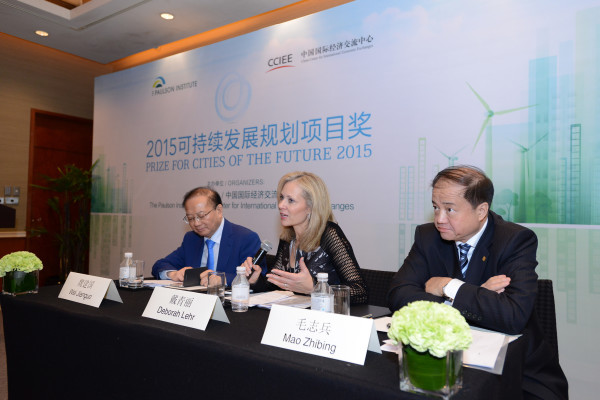
The Paulson Institute, in cooperation with the China Center for International Economic Exchanges (CCIEE) launched the third annual Prize for Cities of the Future at a press conference in Beijing on March 19. The Prize is awarded annually to a project in China that offers a creative, effective and scalable solution to advance environmentally sound development. The competition is designed to promote these efforts to a wider audience and to recognize the achievements of outstanding projects selected by a jury of experts from both the United States and China.
Speaking at the press conference were Paulson Institute Senior Fellow Deborah Lehr, CCIEE Vice Chairman Wei Jianguo and Prize Juror Mao Zhibing, Chief Engineer of China State Construction and Engineering Corporation (CSCEC). Ye Qing, a representative of the Shenzhen Low-Carbon City Project—the 2014 prize winner—also spoke at the event, which was attended by Chinese media, international and Chinese NGOs and representatives from private companies and financial institutions.
“The criteria are broad by design—as this is clearly a growing field in China,” Paulson Institute’s Lehr said. “We hope to find solutions that can be scaled not only across China—but also across the world in other places that are facing similar challenges.”
“The ripple effects of winning the award have gone way beyond our expectations,” Ye Qing said, reflecting on the impact of winning the 2014 Prize. “It has further solidified the resources and commitment of the municipal government to sustainable development in Shenzhen.”
The Low-Carbon City Project stands out because the planners are developing a district in Shenzhen organically, upgrading buildings while cleaning the environment and attracting higher-tech, low-carbon industry. What they didn’t do is just as interesting: they did not tear down existing buildings and build high rises that might have later become canyons of empty buildings.
The Jury Committee will visit 2015 finalist sites in-person over the summer. The Prize will be awarded to representatives from the winning nomination by Paulson Institute Chairman Hank Paulson and CCIEE Chairman Zeng Peiyan in October 2015 in Beijing.



